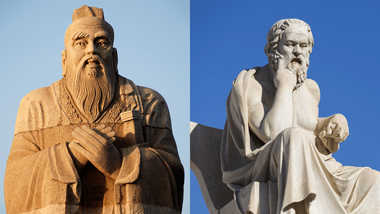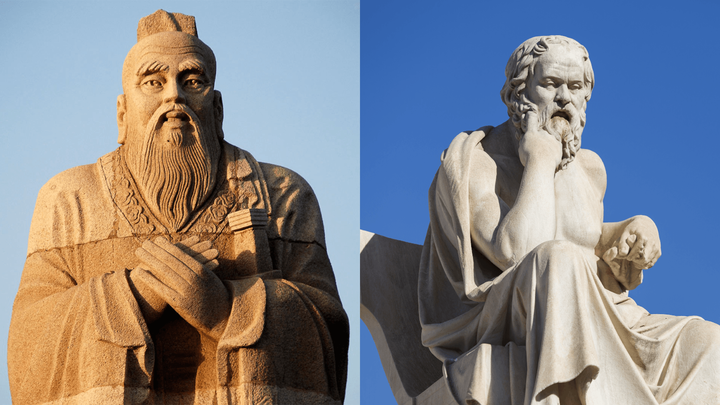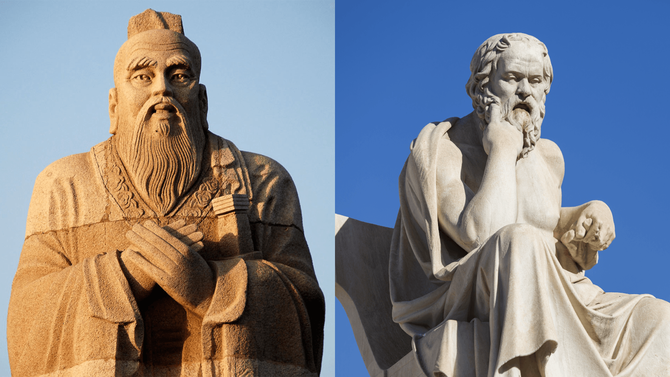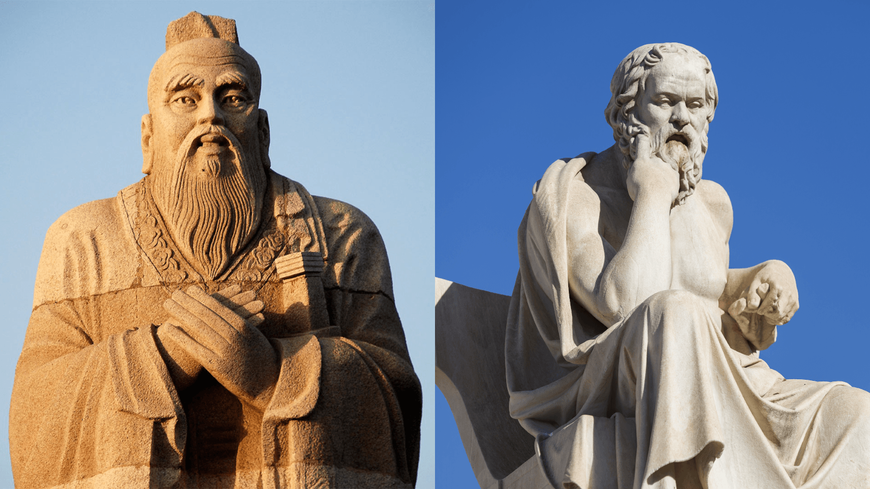



The prominent Greek philosopher Socrates and the great teacher of the Chinese nation Confucius tried to solve the same issue fostered by the life itself – they endeavored to find a means to get over turmoil, distemper, and anarchy in the society, they sought to make it firm balanced unity, to convert chaos to order.
But what is order in general? Put in the language of that epoch this question is stated as follows: what are we to take as a “paragon” of order and consistency? How should perfect social fabric look like? The difference between the eastern and western cultures lies in the answer they offer for these questions.
The difference in the attitude towards the means of solving the issues disturbing society came out of the peculiarities if historical preconditions and the period they lived in. Both Socrates and Confucius at the time of significant social changes accompanied by frequent wars, as well as society demoralization and political perturbations. Socrates witnessed florescence of Greece as Pericles was in reign, as well as did he see its overwhelming defeat in the Peloponnesian wars and the severe rule of the Thirty Tyrants. Confucius lived at the time when the traditional slave-owning system was on the verge of decline while various political powers were fighting for power. All these factors lead to crises, and the philosophers tried to find a way to understand them and their origins and tackle them mending the social structure. Basically, this was the main common aim of Socrates and Confucius.
The principal difference between them lay in the way they chose to treat the issue. The view on human nature and morality is considered to be the theoretical basis of their teachings. Socrates shifted focus from speculations about the afterlife, the gods and nature to meditation on how to live in this world. He saw the solution to a problem in reason. The reason is what can open the essence of a “paragon” for order; what we wish to create should be first developed in our mind. Socrates’ famous admonition “Know thyself” implies the importance of knowledge in human affairs. Knowledge of good is wisdom, and a one should devote oneself to the perception of one’s own moral nature (Socrates consider a human to be moral by nature), this was an integral part of a human’s life (Jichen, Paxson). Generally, Socrates proposes to acquire some new knowledge and then – virtue as virtue is knowledge (of the good). Meanwhile, Confucius has a different point of view on the prior task of philosophical teaching. According to his position, there already is a “paragon” of order which is unnecessary to invent. It’s antiquity, the rules the ancestors used to follow, their customs and rituals; when they are observed, there comes the reign of order and harmony, but when they are forgotten and neglected, there comes chaos and distemper. So, in this respect, we see the contrast between Socrates relying on wisdom and reason and Confucius resting upon rituals.
According to Confucius, the governor is sheng (perfectly wise), and his task is not to seek new knowledge but to restore lost customs. Confucius believes that the order depends on revitalizing the old ritual as forgetting them has led to chaos. He sees the main objective in the recovery of the previous order. The disorder is caused by losing the way and Dao. But the perfectly wise, Sheng himself embodies order, harmony, antiquity, he is nearly an incarnation of Dao. Though there is no clear definition for virtue in the teaching of Confucius, he offers his understanding of morality. "Govern the people with severity, - he states, - keep order among them by chastisements, and they will flee from you and lose the sense of shame. Govern them by moral force, keep order among them by ritual and they will keep their sense of shame and come to you of their own accord.” This quote means that law is not as powerful in ruling society and maintaining harmony as morality.
Greece proclaims the value of reason and the wise individual and focuses on the new knowledge opened with help of reason. At the same time, the Chinese view states the value of ritual and traditions orientating on the antiquity. The general philosophical aims coincide, but the ways for their pursuing discord.
The difference between eastern and western philosophy lies in the difference of world perception. The Greek ideology, according to Plato’s conception, proclaims imperfection and inconsistency of the material world and excellence of the world of ideas. Greeks perceive the sublunar realm as chaos. According to Confucianism, harmony can be achieved through attaining knowledge and wisdom only. The Chinese ideology does not offer any escape from the outer world, on the contrary, the philosophy of Confucius regards our world as the only possible place where one can exist, thus, achieving balance with the environment is vital to succeed in locating a proper philosophical approach in one's life.
That is why they think that it is only possible to achieve harmony through attaining knowledge and wisdom; if philosophers rule the world, the order will reign.
Thus, having considered two types of world overlook – eastern and western – we can make a conclusion that they are based on two different social environments. In Greece we observe polis and democracy; in China – the state headed by the governor reigning on behalf of Heaven. Eventually, these peculiarities influence the formation of two different cultures with varying perceptions of the world and reality. In particular, a democratization of the political sphere and absolution from ritual deliver a free individual building life on the basis of knowledge.